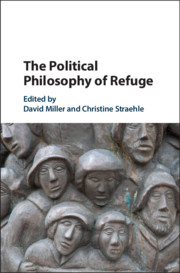Book contents
- The Political Philosophy of Refuge
- The Political Philosophy of Refuge
- Copyright page
- Contents
- Contributors
- Introduction
- Chapter 1 Differentiating Refugees
- Chapter 2 The State’s Right to Exclude Asylum-Seekers and (Some) Refugees
- Chapter 3 Asylum, Speech, and Tragedy
- Chapter 4 Border Rescue
- Chapter 5 Selecting Refugees
- Chapter 6 Refugees and the Right to Remain
- Chapter 7 The Duties of Refugees
- Chapter 8 Is Return the Preferred Solution to Refugee Crises?
- Chapter 9 Refugees and the Right to Return
- Chapter 10 Refugees, Rescue, and Choice
- Chapter 11 Philosophical Foundations for Complementary Protection
- Chapter 12 The Ethics of Sanctuary Policies in Liberal Democratic States
- Bibliography
- Index
Chapter 11 - Philosophical Foundations for Complementary Protection
Published online by Cambridge University Press: 01 November 2019
- The Political Philosophy of Refuge
- The Political Philosophy of Refuge
- Copyright page
- Contents
- Contributors
- Introduction
- Chapter 1 Differentiating Refugees
- Chapter 2 The State’s Right to Exclude Asylum-Seekers and (Some) Refugees
- Chapter 3 Asylum, Speech, and Tragedy
- Chapter 4 Border Rescue
- Chapter 5 Selecting Refugees
- Chapter 6 Refugees and the Right to Remain
- Chapter 7 The Duties of Refugees
- Chapter 8 Is Return the Preferred Solution to Refugee Crises?
- Chapter 9 Refugees and the Right to Return
- Chapter 10 Refugees, Rescue, and Choice
- Chapter 11 Philosophical Foundations for Complementary Protection
- Chapter 12 The Ethics of Sanctuary Policies in Liberal Democratic States
- Bibliography
- Index
Summary
A significant percentage of the people outside their country of citizenship or residence who are unable to meet their basic needs on their own, and need international protection, do not fall under the definition set out in the UN Refugee Convention. This has led many – both academic commentators and activists – to call for a new, expanded refugee definition, preferably backed up by a new, binding, international convention. In earlier work, I have resisted this call, arguing that there is good reason to pick out a sub-set of those in need of international aid – a set that largely, if not completely, corresponds to those picked out by the Refugee Convention – for special benefit and protection. However, even if Convention refugees are in some ways special, we are left with the question of what, if anything, is owed to those in need of aid who are not Convention refugees. In this chapter, I set out philosophical foundations for so-called complementary protection.
- Type
- Chapter
- Information
- The Political Philosophy of Refuge , pp. 211 - 230Publisher: Cambridge University PressPrint publication year: 2019
- 5
- Cited by

